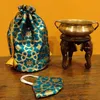This Bengaluru startup is making fashion sustainable in every sense
Bengaluru fashion startup The August Company is supported by three pillars of sustainability — social, economic, and environmental. Its workforce comprises 90 percent of women employees.
As a child, Vidhi Singhal was very passionate about fashion. In fact, in 2017, she quit her corporate job to start The August Company — a sustainable fashion startup — in Bengaluru.
“A study released in 2018 documented that the ubiquitous plastic shopping bag was found at 36,000 feet depth in the ocean. Reading about this moved something in me. It was the wake-up call we all needed,” Vidhi tells SocialStory.
At first, the startup stopped using polyester fabrics as every time a polyester garment is washed, millions of microfibres are released into the ocean. Microfibers are tiny strands of plastic that are consumed by aquatic life.

Vidhi Singhal
To tackle this, Vidhi decided to adopt eco-conscious collections that are polyester and synthetic-free with her startup.
Today, the startup works on the three pillars of sustainability — social, economic, and environmental. The August Company’s workforce comprises 90 percent of women. In fact, it pays fair wages and fixed salaries to all its employees.
The startup ensures its products are environment-friendly and makes accessories with remnant fabrics. It also uses sustainable materials like waste paper for packaging purposes.
Sustainably comfortable clothing
“We make classic, timeless, high-quality women’s wear with natural fibres only. The idea is that if our customer wants to wear our products 10 years down the line, she should be able to do so, provided they fit into it,” says Vidhi.
Apart from fabrics and trims, The August Company also ensures high-quality standards of stitching at its in-house production facility.
It uses khadi, block print techniques, handloom ikats, tie and dye techniques, and cotton handloom fabrics for its products.
These traditional handwoven and printed fabrics techniques are passed down from one generation to another in families that practice the craft.
To make it more relevant for the youth, the startup uses these fabrics as the base and adds contemporary designs to make comfortable clothes, including jackets, dresses, co-ord sets (two-piece coordinated outfits), etc.

Some of the vibrant and sustainable fashions by The August Company
“As we are a small brand, the logistics are a nightmare currently. But we aspire to work directly with the native artisans. We source the fabrics from cooperatives, craft clusters, and those who work with these weavers throughout the year, and, in turn, help them with sourcing the yarn dyes and loom maintenance,” Vidhi explains.
The startup employs tailors, pattern-maker, helpers, ironing resources besides staff for merchandising, designing, and marketing. Vidhi says this further empowers the weavers who make these clothes.
“As our sales increase, so does the number of fabrics produced by these weavers, which, in turn, helps them earn a better livelihood, and above all, retain the crafts’ age and dignity. This also encourages these artisans to continue to pass on the skills to their next of kin,” she says.
The startup manufactures in small lots as per the real-time demand to avoid adding to the millions of garments that never get worn. In terms of waste, it uses cutting scraps to make fashion accessories like headbands, scrunchies, potli bags, etc.
In fact, it reuses printed paper, glass bottles, ceramic tea mugs, eliminated plastic, and cellophane wrapping material to create packaging material out of waste paper at its in-house facility towards its effort to be a truly sustainable fashion brand.
Impacting women
Madhu is one of the women employees who joined The August Company in 2018 as a helper. Her hard-working nature married with an eye for detail helped her understand the Quality Check (QC) process, post which she was promoted to the Quality Audit (QA) team.
“I have worked for other companies before, but The August Company is very different from others. We have a homely feeling. Also, there is no difference between the boss and the workers. We all work happily towards the growth of the company as one big family,” she shares.
During the lockdown, these women even brought their children along with them who would either study or play around the office.

100 percent of the tailors at The August Company are women
“We pay fair wages to our staff and have regular team lunches, where all of us sit and eat out of banana leaves together. We believe such easy practices help bring social and economic justice, eliminating the class distinction,” Vidhi shares.
About 100 percent of the startup’s tailors are women and are employed at fixed monthly salaries besides statutory benefits, paid leave, etc.
The August Company’s products are priced between Rs 990 and Rs 6390, and the average price of a garment is Rs 2590. The price depends on the type of fabric, design, labour costs, etc.
The bootstrapped startup used all the investment on equipment, machines, people, digital marketing, website, etc. So far, its working capital has come from personal and family savings, Vidhi claims.
The pandemic and its challenges
Before the COVID-19 pandemic, The August Company’s sales were driven through a couple of prominent ecommerce and a few other channels.
“The pandemic drove our entire setup to a grinding halt. In April 2020, we could get special permission for a limited re-opening for the production of masks. Our masks — tailored out of cotton — found good acceptance and kept the permitted skeleton staff busy for a few months,” says Vidhi.

The children studying while their mothers are hard at work
In fact, the startup also revamped its website and hired a digital marketing team to direct maximum sales through a direct-to-consumer model.
Talking about the road ahead, Vidhi hopes to work with more diverse traditional fabrics in modern silhouettes.
“We would love to reach a point where we can work with the weavers and craftsmen directly. To complement our present range, we would like to cater to other sections and add more categories like accessories and footwear, besides going international,” she says.
Edited by Suman Singh








